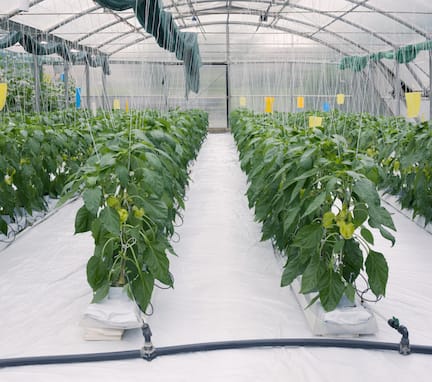Organic Agriculture and Hydroponics
The USDA’s National Organic Program is allowing the certification of hydroponic operations despite the law governing organic agriculture which clearly states that nurturing the fertility of the soil is an integral part of organic management.
When food grown without soil is allowed to carry the organic label, the environmental and health benefits that underpin organic farming are lost, and legitimate, soil-based farmers who steward the land are unfairly undercut by this cheaper, industrialized growing method.
Unlabeled, it is impossible for organic consumers to tell what hydroponic fruits and vegetables are being imported from Canada, Mexico, and Holland — countries where hydroponic produce cannot legally be labeled “organic!”
 |
(c) Dario Sabljak/Adobe Stock |
Fruits and vegetables that are grown with hydroponics or in containers are frequently produced inside sealed warehouse-sized buildings under artificial lighting. Liquid fertilizer used to feed the plants can come from a myriad of different waste products or even highly processed GMO soybeans.
What do the founders of the organic movement have to say?
“We are in danger of losing 50 years of hard fought gains in the healthy soil movement. Organic has always meant grown in the soil. We refuse to let the promise of organic agriculture be compromised by profiteers. We have won before and we will win again.”
– Eliot Coleman, Agrarian Elder and owner of Four Season Farm“Organic pioneers such as Albert Howard, Eve Balfour, Rodale, and Albrecht all wrote about soil as the basis for organic farming. We have a right to the word organic….It’s such a bizarre concept that you can take what we call ‘amendments’ and make it the whole system.”
– Jake Guest, Agrarian Elder and owner of Killdeer Farm“Renewing the soil without pesticides or chemical fertilizers is also one of the few solutions to global warning. Regeneration is trying to take emissions that have already been produced and put them back in the soil. Our soils are our single biggest sink for carbon so that we can actually fix climate change by taking all those greenhouse gasses and putting them back in our soils, and we know we can do that with organic farming.”
– Will Allen, owner of Cedar Circle Farm
The National Organic Standards Board (NOSB) voted in November 2016 to send the hydroponics issue back to subcommittee. This move maintains the status quo of hydroponic operations continuing to be certified as organic at least until a NOSB vote on the issue occurs.
It is incumbent upon the current NOSB and USDA officials to respect past NOSB recommendations banning hydroponics.
Additional Resources:
- Read Cornucopia’s article on the NOSB fall 2017 vote
- Read Cornucopia’s comments on hydroponics and container growing to the NOSB for their fall 2017 meeting
- Read Cornucopia’s formal legal complaint
- Read Cornucopia’s news release on hydroponics
- Read Cornucopia’s action alert on hydroponics
- Read Cornucopia’s White Paper on aquaponic and hydroponic production
- Sample text for comments to Regulations.gov
- Read what organic leaders are saying about hydroponic production in organic agriculture
- Enjoy this video from The Organic Center:
Organic farming creates soil health, which has enormous benefits for human and environmental health. While hydroponic container growing has its merits, it is not organic agriculture.
Hydroponics needs its own label so consumers can make informed decisions.
In a letter to USDA Secretary Tom Vilsack sent in spring 2016, organic farmers formally requested an immediate moratorium be declared on the organic certification of all new hydroponic and aquaponics operations. The USDA has failed to do so.
Farmers rallied at the fall 2016 NOSB meeting, demanding to keep soil in organics:
(Note: This video contains brief language which may be objectionable to some viewers)
These farmers also have a petition you can sign at Keep the Soil in Organic.

